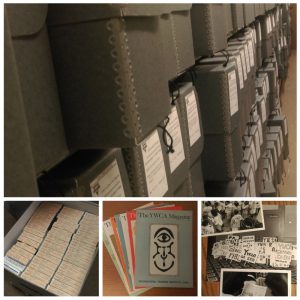Hello All! I’m Gracie Elliott, the Smith College student assistant working with Mandy on the YWCA Digitization project. I started in February 2017 and worked part time for the duration of that semester, went full time over the summer break, and went back to part time once the school year began. As we work through the final stages of the project, and draw closer to the digital release, I have been invited to reflect on my perspectives and experiences being a part of it. When I started with the project a little over a year ago, I came in with an elemental understanding of archival work, and as a complete metadata novice. However, I was fascinated with the prospect of working in an archive, especially one with Smith’s feminist leanings, and thought it would be a useful educational experience to have before I graduated. I didn’t realize how cool it was going to be to assist with a specific project, and how much knowledge I would acquire by the time the project is finished. Continue reading
Musings
Tough but important
Today as I describe microfilm records relating to the internment of Japanese Americans during World War II I remind myself of the importance of sharing this tough information and I am heartened by the efforts of the YWCA to advocate … Continue reading
The Power of Primary Source
The YWCA of the U.S.A. has been, from the beginning, a far reaching and forward thinking organization attacking the problems and injustices of the times through their work with women around the world. The record keeping standards of the organization means that the detailed and personal narrative accounts of women in ‘the field’ are preserved for generations to read. I have been struck many times by the first hand accounts of injustices women encounter from African American YWCA leaders being denied their spot on the train to vivid descriptions of the atrocities of World War II. There are also moments of joy and triumph as new strides are made for women’s rights and social justice. Reading the personal accounts make me feel, if only temporarily, directly connected to the time and people. There is also a unique ability to spark more empathetic and connected contemplation of the realities around me. Everything is connected. It is the nature of the primary source that evokes these feelings. Rather than reading about World War II in a novel or text book, reading a person’s feelings at the time as they are experiencing it personalizes and humanizes history and allows me to see in a new light the things around me. Instead of happening ‘back then’ it is happening as I read it and that is powerful.
This amazing ability to transform the reader to another time and place is why I am so excited to be working on this project. Hopefully when the digitized items are available for searching and viewing you will be able to be carried away as well.

